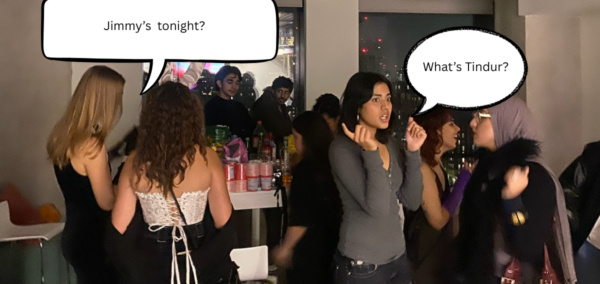
‘It’s normal, because it’s uni’: Inside Liverpool students’ relationships with ketamine
A survey by The Liverpool Tab found 73 per cent of students don’t know if their uni offers support
Liverpool councillors have have raised the alarm over students’ use of ketamine, warning that it’s no longer just a “party” drug used on nights out, but a substance “stealing the futures” of young people.
The local council has delivered an action plan to the Secretary of State For Health, which calls for a reclassification of ketamine, from a Class B to a Class A substance, across the country.
A survey conducted by The Liverpool Tab discovered that 27 per cent of Liverpool students* have tried ketamine at least once in their lifetime.
Students across campuses have claimed that taking substances at university “ties in with drinking culture” and that well known party drugs such as cocaine and ketamine are “definitely more normalised” than they expected.
One student also expressed that despite hearing about multiple ketamine related deaths across the UK, it hasn’t altered her perception or usage of the substance.
Councillors have claimed that the substance is becoming “more and more” spoken about amongst the student community.
This also occurs in the wake of an anonymous survey conducted by The Tab earlier this year, which highlighted that students at University of Liverpool consume the fifth highest amount of ketamine across every Russell Group university in the UK.
Students at UoL have also been proven to take more cocaine than any other Russell Group institution in the country.
The Liverpool Tab spoke to 194 students, spanning across each university in the city, to uncover their thoughts on drug culture, support systems and the use of ketamine within the student scene.

27 per cent of students have tried ketamine
Most Read
Out of 194 respondents, 27 per cent of students in Liverpool have tried ketamine at least once in their lifetime, according to our survey.
Abbie*, a student from the University of Liverpool, told The Liverpool Tab that the drug culture surrounding ketamine is “definitely not as bad as other cities”. She cited Manchester as a notable Russell Group university location where she believes student culture is more drug-orientated than Liverpool.
Katie, a student based in Manchester, also reached out to The Liverpool Tab to speak about her own experiences with ketamine. In the year leading up to her first year of university, she began using the substance as a party drug, before her casual usage became the fuel for her addiction.
“There had been a bad patch where I went through 16 grams in 48 hours. I did that twice in the space of a week” she said.
Katie confirmed that the freedom her university lifestyle allowed her to consume substances at an unexpected rate, at any time. She told The Liverpool Tab that she tried to downplay her usage as “normal, because it’s uni”.
20 per cent of students know someone who has struggled with substance abuse
The survey conducted by The Liverpool Tab highlighted that seven per cent of students have struggled with substance abuse before and during their time at university. Two per cent of these students had also engaged with support services provided by their university, aimed to assist those struggling or at risk of abusing substances like ketamine.
Out of 188 responses, 20 per cent of students also know of someone who has made use of support services, even if they haven’t themselves. Many people can be completely unaware of friends or family struggling with issues surrounding substance abuse, as many try to hide it.
Another student, Jessie*, told The Liverpool Tab that they knew friends who used to purposely send themselves into k-holes for fun. This would consist of taking large amounts of ketamine in one sitting with the intention of entering a dissociative state.
Jessie* recounted a story in which one of their friends experienced “a nasty trip, resulting in him developing sleep paralysis.
“He would see shadow people, which resembled the same hallucinations he would experience when taking ketamine”.
The student also struggled with depression, which fuelled his drug use.
Jessie* explained to The Liverpool Tab that their friend has since sought support from his university.
73 percent of students do not know if their university offers support
73 per cent of survey respondents did not know if their university has support available for students struggling with substance abuse, or mental health issues linked to their drug use.
Moreover, 45 students were aware of their university’s support systems, which counted for only 25 percent of survey respondents. Four students told The Liverpool Tab that their university does not offer services tailored towards substance abuse.
Dr Harry Sumnall, professor of substance abuse at Liverpool John Moores University, has highlighted an increase in students seeking help through local drug services.
The BBC reported that one of the issues in Liverpool was a lack of local data about how widespread use was in the city. Figures have shown more students are making use of support systems outside of on campus services.
Dr Harry Sumnall also claimed that that urologists in local hospitals are raising concern over ketamine related damage to the bladder, especially amongst heavier users of the substance.
90 per cent of students want to see their university offer more support
An overwhelming amount of students expressed their interest in seeing their university make more of an effort to employ support services aimed at students struggling with substance abuse.
141 students, making up 90 per cent of survey respondents, told The Liverpool Tab that on campus services should be more widely available and encouraged by student unions and wellbeing teams across the city.
Only 16 students declared that they didn’t want to see this happen.
A former Liverpool student contacted The Liverpool Tab to discuss the extent of his addiction, which he believed was fuelled by the drug culture within his university community as an undergraduate.
Nathan*, who has since been admitted to rehab for his ketamine addiction, told The Liverpool Tab the problem started when he first took ketamine on his own. This began in 3rd year of university. His bad habits didn’t leave when he graduated.
At his worst, Nathan* claimed he was consuming an ounce of ketamine a week when he reached 27.
Nathan* also experienced ketamine cramps due to his high usage of the substance, and was admitted to hospital at one point as his consumption had severely damaged his gallbladder, causing him intense pain.
Nathan* expressed his belief that the university drug culture he was involved in at the time caused his addiction.

77 per cent of students think drugs are an issue at university
In the survey conducted by The Liverpool Tab, 77 per cent of students summarised that drug culture has impacted their lives at university, and that substance use is viewed as an issue amongst the student community.
Gemma*, a student at the University of Liverpool, claimed that the use of drugs like ketamine and cocaine seemed rife amongst student communities.
She said: “It’s so normalised. Like I said I don’t want to do drugs and I was met with shock”.
Only 21 students claimed that drugs did not pose an issue to them, compared to the 145 that did. 22 students expressed their uncertainty on the subject, saying that they were unsure and didn’t know if substances like ketamine were viewed as an issue.
Councillors across the Liverpool City region have now called for the reclassification of ketamine, and amongst those backing the demands is Sandra Larmour, the mother of a teenager who died after taking ketamine on her first day at Newcastle University.
Sandra told the BBC: ‘The dangers of ketamine are real, and those involved in the supply need to be dealt with accordingly”.
Labour councillor Lynnie Hinnigan, who works with vulnerable young people across the area, told a council meeting she’s hearing about students’ involvement in taking ketamine “more and more”.
Speaking to BBC Radio Merseyside, she said that ketamine as a substance is “stealing the futures” of young people across Liverpool.
“You can see the impact on social media too, with teenagers sharing videos of people using the drug, they think it’s funny but it’s absolutely not” she added.
Following the results discovered by The Liverpool Tab regarding students’ lack of knowledge on campus support systems directed to those struggling with substance abuse, a spokesperson from the University of Liverpool said: “We are fully committed to supporting our students during their time with us and have specific support in place for those struggling with substance misuse.
“This includes bespoke, confidential weekly support on campus, which has been provided by Mersey Care NHS Trust specialist alcohol service and We Are With You, a local drugs charity.
“We would always encourage anybody struggling with their mental health to contact our Wellbeing Advice and Guidance Team, who can provide support and signpost other appropriate services”.
*Some names have been changed to protect student’s anonymity.
*Based on 194 respondents





















